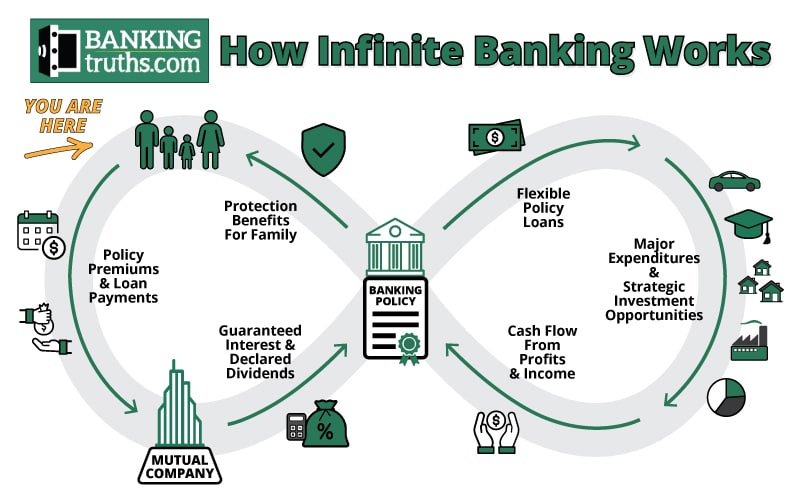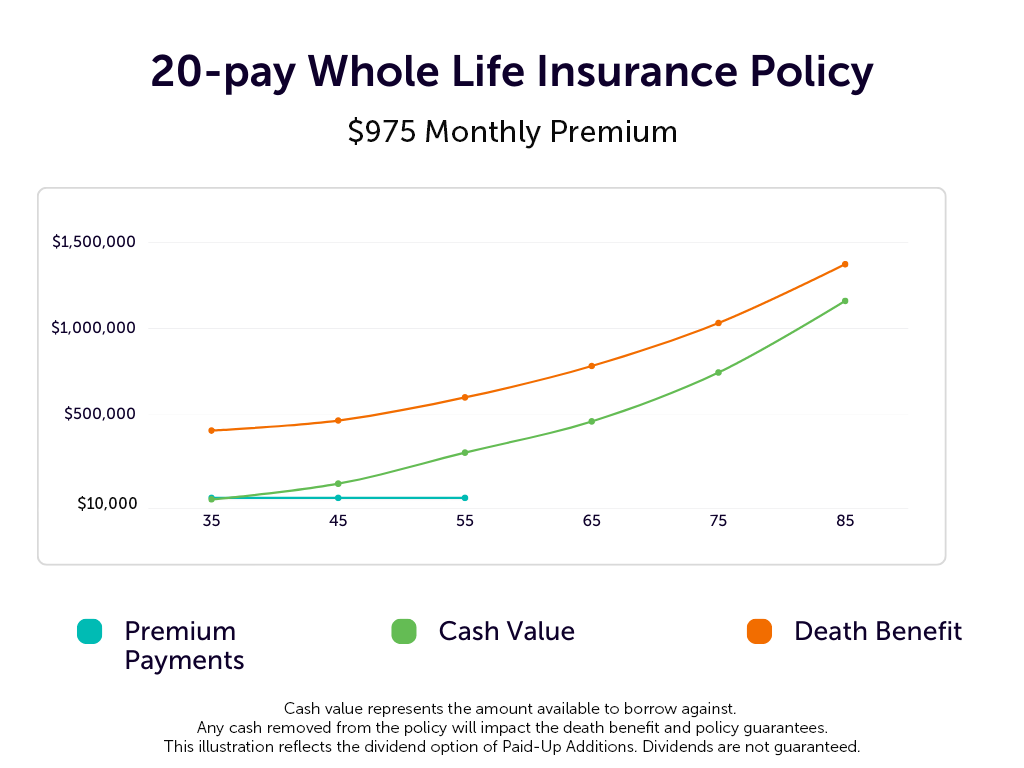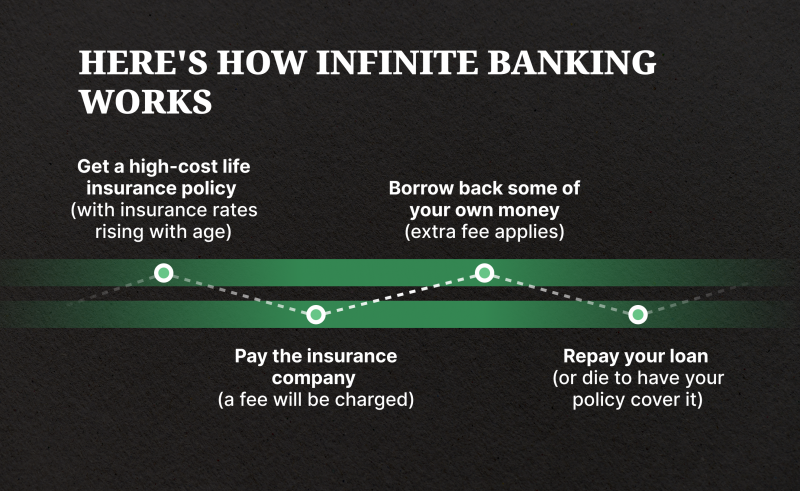All Categories
Featured
Table of Contents
So it is not mosting likely to be some magic path to wealth. However it will certainly aid you gain a little bit more on your cash long-term - infinite income system. Of program, there are various other benefits to any kind of whole life insurance policy. For example, there is the fatality benefit. While you are trying to minimize the proportion of premium to fatality benefit, you can not have a policy with absolutely no survivor benefit.

Some individuals marketing these plans suggest that you are not interrupting substance interest if you obtain from your plan instead than withdraw from your savings account. That is not the case. It interrupts it in exactly the exact same means. The cash you obtain out makes nothing (at bestif you do not have a laundry funding, it may also be costing you).
That's it. Not so sexy currently is it? A lot of individuals that acquire right into this idea likewise purchase right into conspiracy theories about the globe, its governments, and its banking system. IB/BOY/LEAP is placed as a means to in some way stay clear of the globe's economic system as if the globe's biggest insurance provider were not part of its economic system.
It is purchased the basic fund of the insurer, which largely purchases bonds such as United States treasury bonds. No magic. No revolution. You get a bit higher passion price on your cash money (after the first couple of years) and perhaps some possession defense. That's it. Like your investments, your life insurance policy ought to be monotonous.
Ibc Banking Concept
It appears like the name of this idea adjustments when a month. You may have heard it referred to as a continuous wide range strategy, household banking, or circle of wide range. No matter what name it's called, unlimited financial is pitched as a secret way to construct wealth that just abundant individuals find out about.
You, the insurance holder, placed cash right into a whole life insurance coverage plan through paying premiums and acquiring paid-up enhancements. This increases the cash money worth of the policy, which means there is even more cash money for the dividend price to be related to, which generally indicates a greater price of return on the whole. Dividend prices at significant service providers are currently around 5% to 6%.
Standard Chartered Bank Visa Infinite Credit Card
The entire principle of "financial on yourself" just functions because you can "financial institution" on yourself by taking financings from the plan (the arrowhead in the chart above going from whole life insurance policy back to the insurance holder). There are two various kinds of lendings the insurance provider might offer, either straight acknowledgment or non-direct acknowledgment.
One feature called "laundry lendings" sets the rates of interest on loans to the exact same rate as the returns rate. This means you can obtain from the plan without paying interest or receiving passion on the amount you borrow. The draw of unlimited financial is a dividend rates of interest and ensured minimal price of return.
The disadvantages of infinite financial are typically neglected or otherwise pointed out in any way (much of the information offered about this idea is from insurance coverage agents, which may be a little biased). Just the cash value is growing at the dividend price. You also have to spend for the cost of insurance coverage, charges, and costs.
Companies that provide non-direct recognition lendings might have a reduced dividend rate. Your money is secured right into a complicated insurance policy item, and abandonment fees typically don't go away until you've had the plan for 10 to 15 years. Every permanent life insurance policy policy is different, yet it's clear somebody's overall return on every buck spent on an insurance policy item could not be anywhere near to the dividend rate for the plan.
Unlimited Life Policy
To give a very fundamental and theoretical instance, let's assume a person is able to earn 3%, on standard, for every buck they invest on an "boundless banking" insurance policy item (after all costs and charges). If we assume those dollars would be subject to 50% in taxes amount to if not in the insurance coverage product, the tax-adjusted rate of return could be 4.5%.

We presume greater than ordinary returns overall life product and an extremely high tax obligation rate on dollars not take into the policy (that makes the insurance coverage item look far better). The fact for many individuals may be worse. This pales in contrast to the lasting return of the S&P 500 of over 10%.
Infinite Banking Concept Reviews
At the end of the day you are acquiring an insurance coverage product. We like the protection that insurance coverage provides, which can be obtained a lot less expensively from an inexpensive term life insurance coverage plan. Overdue loans from the plan might likewise reduce your death advantage, reducing an additional degree of protection in the plan.
The concept just works when you not only pay the considerable premiums, but utilize extra cash money to buy paid-up additions. The chance expense of all of those bucks is significant exceptionally so when you could rather be buying a Roth Individual Retirement Account, HSA, or 401(k). Also when compared to a taxable investment account or even an interest-bearing account, boundless banking might not offer comparable returns (compared to investing) and similar liquidity, gain access to, and low/no fee structure (contrasted to a high-yield financial savings account).
When it comes to economic preparation, whole life insurance policy usually stands out as a popular alternative. While the concept could appear appealing, it's crucial to dig deeper to understand what this truly means and why watching whole life insurance in this means can be deceptive.
The concept of "being your own financial institution" is appealing due to the fact that it recommends a high level of control over your funds. This control can be imaginary. Insurance firms have the supreme say in exactly how your policy is managed, including the terms of the lendings and the rates of return on your cash value.
If you're taking into consideration entire life insurance policy, it's important to see it in a broader context. Whole life insurance policy can be a useful tool for estate planning, providing an assured survivor benefit to your recipients and potentially providing tax obligation benefits. It can additionally be a forced savings vehicle for those who struggle to conserve cash consistently.
Bank On Yourself Scam
It's a type of insurance coverage with a savings component. While it can provide stable, low-risk growth of cash worth, the returns are normally reduced than what you might achieve via other financial investment automobiles. Before leaping right into whole life insurance policy with the concept of boundless banking in mind, take the time to consider your financial objectives, risk resistance, and the complete variety of financial products available to you.

Infinite financial is not an economic panacea. While it can operate in specific situations, it's not without dangers, and it needs a considerable commitment and recognizing to take care of efficiently. By identifying the prospective risks and understanding real nature of whole life insurance policy, you'll be much better equipped to make an educated decision that sustains your economic health.
This book will certainly show you exactly how to set up a banking plan and how to use the banking plan to purchase realty.
Unlimited banking is not a services or product supplied by a specific establishment. Boundless financial is a method in which you buy a life insurance policy policy that accumulates interest-earning cash money worth and obtain car loans versus it, "borrowing from yourself" as a resource of resources. After that ultimately pay back the funding and start the cycle around once more.

Pay plan costs, a part of which constructs money value. Take a car loan out versus the plan's cash money value, tax-free. If you use this principle as planned, you're taking cash out of your life insurance coverage policy to buy whatever you 'd require for the rest of your life.
Table of Contents
Latest Posts
Infinite Concepts Scam
Becoming Your Own Banker
Infinite Banking Nelson Nash
More
Latest Posts
Infinite Concepts Scam
Becoming Your Own Banker
Infinite Banking Nelson Nash